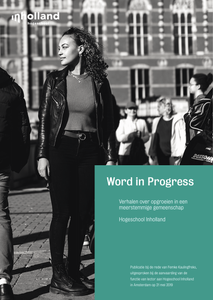De uitgaven van Amnesty Vlaanderen worden door vrijwilligers geschreven. Dit boekje zorgt ervoor dat typische Amnesty-items consequent door iedereen op dezelfde geschreven worden.
DOCUMENT

Although father–child relationships (FCRs) are central to children’s experience of paternal imprisonment, few studies address this subject. A systematic review was conducted to synthesize the literature on paternal imprisonment and FCRs. Four academic databases were searched for peer-reviewed studies. Thirty studies were identified. It was found that FCRs most often deteriorate due to paternal imprisonment, but sometimes remain stable or change positively. Four key factors were found to influence FCRs: (a) the quality of preprison FCRs, (b) the frequency and experience of father–child contact during imprisonment, (c) the child’s primary caregivers’ role in facilitating father–child contact, and (d) prison barriers for maintaining FCRs during imprisonment. The interplay between these factors is essential for understanding FCRs in this context, which may explain children’s divergent experiences of paternal imprisonment. An integrated framework of FCRs in the context of paternal imprisonment is presented. Limitations and directions for research are discussed.
DOCUMENT
Er is in Nederland nog weinig wetenschappelijke aandacht voor het werk van penitentiair inrichtingswerkers (PIW’ers). Onderzoek is tot nu toe vooral gericht op werkdruk en uitval of onderlinge agressie,een enkele uitzondering daargelaten. Het Nederlandse ‘Prison Project’ is vooral gericht op de effecten van detentie op gedetineerden en hun familie en nauwelijks op ervaringen van degenen die met de gedetineerden werken. Een uitgebreid onderzoek naar het functioneren van PIW’ers dateert al van begin jaren negentig. Er is dan ook betrekkelijk weinig bekend over de beleving en de inhoud van het werk van PIW’ers. In Nederland welteverstaan, want daarbuiten zijn mooie studies verricht, bijvoorbeeld door Liebling en collega’s in Groot-Brittannië en recent door Tournel in België. Niet voor niets wordt het werk van PIW’ers getypeerd als ‘low visibility work’. Er is nog weinig bekend over hun werk en de wijze waarop zij dat werk beleven.
DOCUMENT

Blog in het kader van het onderzoeksproject ‘The Network is the Message‘ Met dit onderzoek willen Hogeschool Rotterdam en Hogeschool Utrecht een antwoord geven op de vraag: “Hoe kan de effectiviteit van communicatie in online sociale netwerken worden beoordeeld en verbeterd?” In deze blog: Zoals te verwachten voor een dergelijk controversieel en politiek onderwerp is er een duidelijk onderscheid te zien tussen profit en non profit instellingen: de eerste nemen geen stelling, de tweede wel. Inhakers zijn net gewone social media posts: ze zijn vooral bedoeld om de producten en standpunten van degene die ze maakt te promoten en dat is natuurlijk prima!
DOCUMENT

Publicatie bij de rede van Femke Kaulingfreks, uitgesproken bij de aanvaarding van de functie van lector aan Hogeschool Inholland in Amsterdam op 21 mei 2019.
DOCUMENT

Dit jaar viert Litouwen 27 jaar onafhankelijkheid van het Sovjetregime. De tijd van angst, geweld en leugens zijn nu herinneringen aan deze politieke onderdrukking. Religie en de daaruit voortvloeiende liefdadigheid was ten tijde van de Russis overheersing verboden. Volgens de communisten bestonden sociale problemen niet en dus was het beroep van sociaal werker overbodig. Nu kijkt Litouwentrots terug op een snel ontwikkeld sociaal werkveld met kansrijke initiatieven.
DOCUMENT

Review in het kader van COST Action IS1106 Working group 3 In the review below, we summarize resent empirical research about practising offender supervision in The Netherlands on six theme’s: 1. The roles, characteristics, recruitment and training of key actors in the delivery of offender supervision. 2. Interactions and relationships between key actors in the delivery of offender supervision and other relevant professionals. 3. The delivery/practice/performance of offender supervision. 4. The role of tools and technologies in the delivery of OS. 5. The management, supervision and/or regulation of practitioners and their practice. 6. Reflections / contextual issues Ongoing research is discussed in the descriptions of the different theme’s. We conclude with a short reflection about research on practising supervision in the Netherlands. The review is limited to studies about adults. Studies on community sentences have not yet been addressed, we will do this in the next version.
DOCUMENT

Purpose – The purpose of this paper is to examine the prevalence of psychopathology including substance use disorders in a sample of detained female systematic offenders.Design/methodology/approach – All case files of female systematic offenders who had been subjected to a special court order for systematic offenders in the period 2004-2014 were studied. A total of 81 fairly complete case files were selected for the study. These were all systematic offenders as they had been sentenced for at least 25 offences with an average of 102 offences over a period of 17.5 years. Findings – All except one woman were addicted to substances in the past year, with an average duration of addiction of 21 years. In addition, 53 per cent were diagnosed with another DSM Axis I disorder and 73 per cent were diagnosed with a personality disorder. Furthermore, 32-59 per cent were found to haveintellectual dysfunctions. In total, 12 per cent had one type of the above disorders, 43 per cent two types, 31 per cent three types and 14 per cent all four types. The prevalence rates of these disorders were higher than those reported in other prison studies.Research limitations/implications – It is concluded that female systematic offenders can be characterised as problematic in many respects. Even in such a problematic group treatment can be provided.Originality/value – The present study is the only study that provides prevalence data of mental disorders among female systematic offenders.
DOCUMENT

In de documentaire "Where to invade Next" van Michael Moore, zien we de filmmaker in een aantal Europese landen om zich te laten voorlichten over onderwijs, gezondheidszorg, sociale wetgeving, gevangeniswezen en legalisering drugs. De voorbeelden zijn utopisch te noemen omdat bijvoorbeeld in Finland er minder lessen gegeven worden en er minder huiswerk wordt gemaakt en er ook nog ruimte is voor kunstzinnige en sportieve vakken. Desondanks scoort Finland het hoogste bij meerdere internationale metingen , ook op cognitieve vakken.
LINK